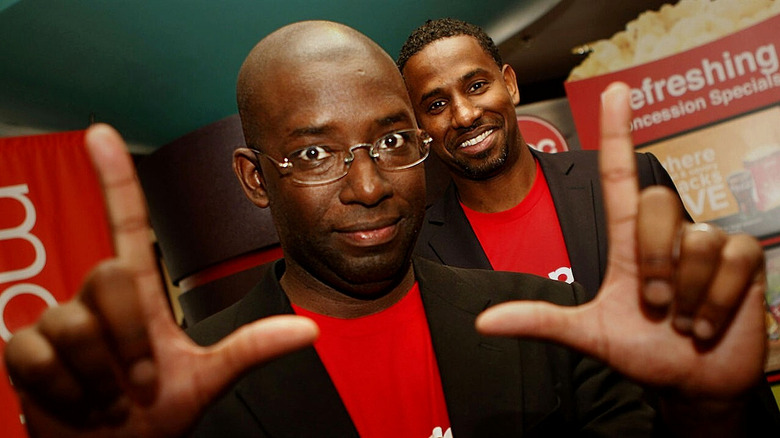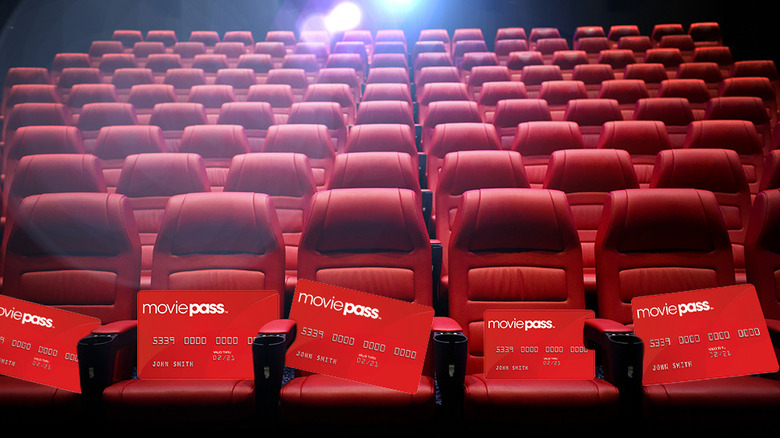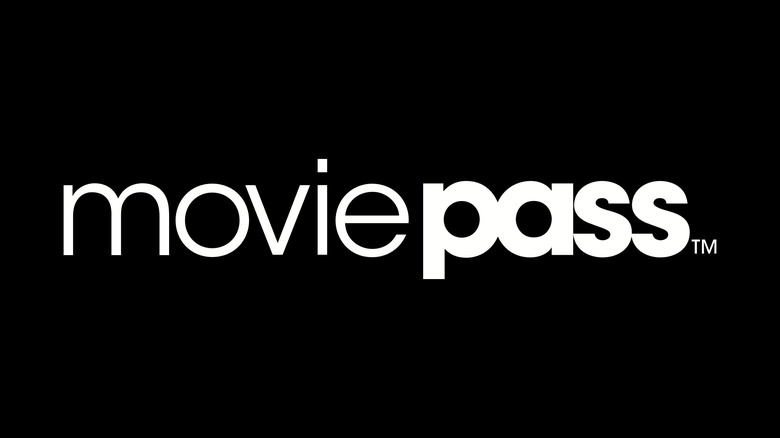The Downfall Of MoviePass Was So Much Worse Than You Realize [SXSW 2024]
If you're a movie lover — specifically someone who loves going to the movies — there's a more-than-decent chance that you got sucked into a MoviePass subscription at some point between 2015 and 2018. At one point, it was a deal that seemed too good to be true. Unlimited movies, all for as low as $10 per month depending on where you live in the country. Either way, it represented insane value for moviegoers and felt like a real moment of change in the industry. Then, it all flamed out in spectacular fashion in the summer of 2018.
MoviePass lost tens of millions of dollars. The business model was called into question, and its parent company ultimately had to file for bankruptcy. It was a disaster of epic proportions. But, it turns out, most of us aren't even aware of just how bad it was behind the scenes. A new documentary is here to shine a light on the app's meteoric rise and unbelievably rapid fall from grace. "MoviePass, MovieCrash" recently premiered at the SXSW film festival in Austin, Texas, and I'm here to tell you it's essential viewing for anyone who got caught up in the madness several years ago.
Without giving it all away, director Muta'Ali provides a comprehensive overview chronicling the company's early days as a relatively humble tech start-up hoping to disrupt the movie business, to the disastrous financial decisions that would eventually dismantle the company. We all know MoviePass was a mess, but it's hard to relay in just a few hundred words just how maddening the larger picture truly is. From a business model that might have actually worked in the long run to a couple of rich, arrogant white guys staging a near-hostile takeover of the company, it's a trainwreck not unlike the Fyre Festival (which was chronicled in not one but two different documentaries several years back).
Who is truly to blame for the demise of MoviePass?
MoviePass was founded by entrepreneurs Stacy Spikes and Hamet Watt in 2011. Both men had success in other industries and had a proven track record. They saw an opportunity to innovate the way movie ticketing was handled in the modern age, as the industry had largely stagnated in the streaming era even before the pandemic. The company had modest success — some speed bumps aside — in those early days. Also, and this is important, Spikes and Watt were Black men. In the venture capital, tech start-up world, this can be a barrier to entry. That's important in this story, for reasons that Muta'Ali lays out perfectly (eliciting much frustration from the viewer) in his doc.
Eventually, former Netflix executive Mitch Lowe was brought on to take over as CEO against the wishes of Spikes, who played along. Once Helios and Matheson CEO Ted Farnsworth was brought into the fold, MoviePass as the general public would come to know it was born. Of note, both Lowe and Farnsworth were white men who had, in some ways, failed upward. Yet, they took over the company that was started by two Black men who were attempting to do things the right way. Impatient and arrogant, the new heads of the company were concerned about the stock price above all else. This drama that was going on as we were all enjoying carefree, dirt-cheap moviegoing is truly illuminating.
Again, I don't want to give away the movie here, but Spikes and Watt had the right idea. They were looking for a sustainable business model, be it partnering with AMC and other theater chains or, at the very least, maintaining a reasonable price point. Lowe and Farnsworth, on the other hand, were concerned with growth above all else. Many in the media called into question the increasingly shaky MoviePass business model. How can charging $10 per month for unlimited movies while the company was paying full price for every ticket be profitable?
MoviePass was too good to be true
In short, it wasn't, and they knew it wasn't. That's why MoviePass officially shut down in 2019. But not before pissing off just about every movie lover that had once seen the company as some sort of savior. When the unlimited plan was initially rolled out, people rejoiced. It seemed too good to be true, mostly because it was. But, for a time, people who hardly ever went to the movies were going all of the time. And people who already went to the movies were going more than ever.
When this excessive use took hold, MoviePass began throttling usage and changing passwords, amongst other shady practices, in an attempt to mitigate the insane losses, all while Lowe and Farnsworth were partying like rockstars. The highs were insanely high, but the lows came fast and hard. Users revolted, and there was no saving the dumpster fire that these two men who took over the company from its more level-headed founders created. Muta'Ali's movie plays out like a true tragedy of unchecked Capitalism in the modern age.
This is all just scratching the surface. What the movie brings to light is worthy of more than a few jaw-drops and eye-rolls. It's both maddening and entertaining, even if it is all wildly disheartening.
Most amazing of all, this whole saga isn't entirely over. Spikes regained control of the company in recent years and has since re-launched MoviePass with a new, hopefully more rational business model. Will it work? It's anyone's guess at this point but after watching this documentary, it would be hard not to root for the guy as he deserves a win. He's the victim in this story, one who is undoubtedly deserving of justice.
"MoviePass, MovieCrash" does not currently have a release date, but look for it sometime later this year on HBO.


